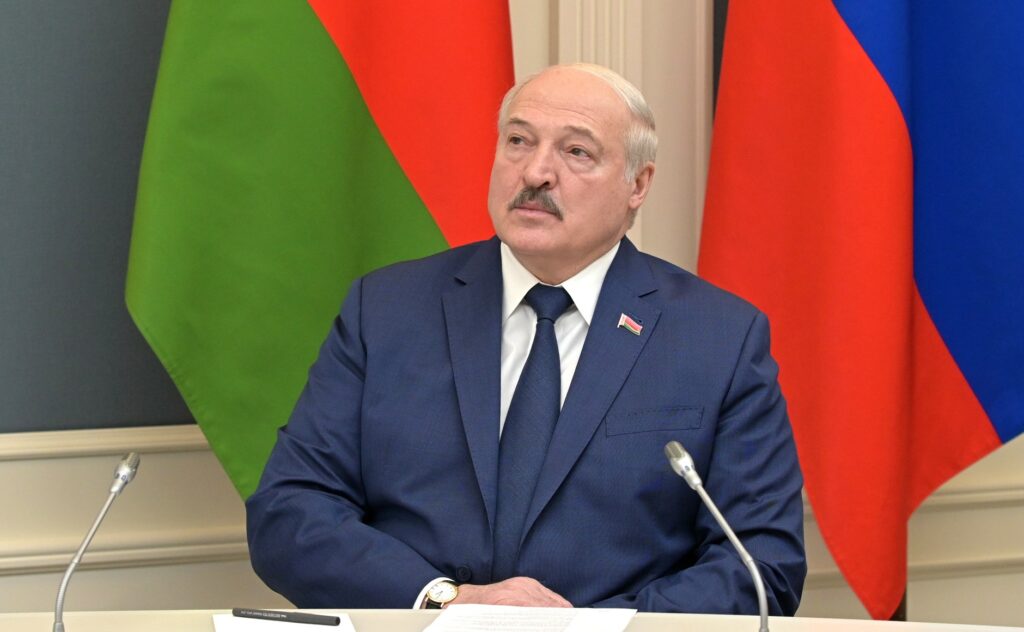Belarusian President Alexander Lukashenko has announced that he is ready to welcome Russian strategic nuclear missiles on his country's territory, in addition to the tactical nuclear weapons that Moscow has already announced it is preparing to send to its closest ally.
Strategic nuclear weapons are significantly more powerful and have a far greater range than tactical or battlefield nukes.
"It will be necessary for [Russian President Vladimir] Putin and I to decide and introduce strategic weapons here, if necessary," Lukashenko said during his State of the Nation Address on Friday. "And they must understand this, the scoundrels there abroad, who today are trying to blow us up from the inside and from the outside."
In a wide-ranging speech, Lukashenko also blamed the US for inciting the war in Ukraine, and suggested that Russia would resort to using nuclear weapons if its leadership believed it faced defeat.
"As a result of the efforts of the United States and its satellites, a full-scale war has been unleashed in Ukraine," Lukashenko said. "A third world war with nuclear fires looms on the horizon."
He added: "It is impossible to defeat a nuclear power. If the Russian leadership understands that the situation threatens to cause Russia's disintegration, it will use the most terrible weapon. This cannot be allowed."
Escalatory rhetoric
Lukashenko's comments follow Vladimir Putin's announcement last weekend that Russia would deploy tactical nuclear weapons in Belarus, stoking further fears of the war in Ukraine escalating into a full-scale confrontation between NATO and Russia.
Putin's announcement was not the first time that the Russian leader has ratcheted up nuclear tensions between Russia and the West since launching his country's full-scale invasion of Ukraine in February last year.
Last month, Putin suspended his country's participation in the New Start Treaty, the last remaining bilateral nuclear weapons agreement between Russia and the US — a decision that was condemned as "completely reckless" by the International Campaign to Abolish Nuclear Weapons (ICAN).
Similarly, last December Putin refused to rule out Russia's first use of nuclear weapons in the event of a full-scale war with the West. In October, he also personally oversaw Russia's annual nuclear exercises which involved, according to Defence Minister Sergei Shoigu, preparation for a "massive nuclear strike by [Russia's] strategic nuclear forces" on Western territory.
Furthermore, in a speech delivered on the eve of the invasion last year, Putin explicitly threatened "those who may be tempted to interfere" in Russia's efforts to subjugate Ukraine with "consequences such as you have never seen in your entire history". Several days later, he put Russia's nuclear forces on "special alert", alarming numerous Western nuclear experts.
Suggesting a ceasefire
At one point, Lukashenko offered to act as a mediator to help implement a ceasefire in Ukraine. "I'll take the risk of offering to stop the fighting [in Ukraine], without the right to move equipment and regroup troops," he said.
However, he also warned that "if the West once again tries to use the pause to strengthen its positions by deception, then Russia is obliged to use all the power of the military-industrial complex and the army to prevent the escalation of the conflict — both phosphorus ammunition, depleted uranium, and enriched uranium."
Related News
- 'No-limits friendship with Putin': EU chief strongly attacks China over its foreign policy
- 'Completely reckless': Anti-nuke group condemns Putin's decision to suspend nuclear treaty
In subsequent remarks, Kremlin spokesperson Dmitry Peskov informed reporters that Russia was aware of Lukashenko's offer to negotiate a ceasefire and that Putin would discuss it further with him next week. However, Peskov also explicitly affirmed that Russia's "goals" in Ukraine could only be achieved through military means.
"In terms of Ukraine, nothing is changing, the special military operation is continuing because today that is the only means in front of us to achieve our goals," Peskov said.

